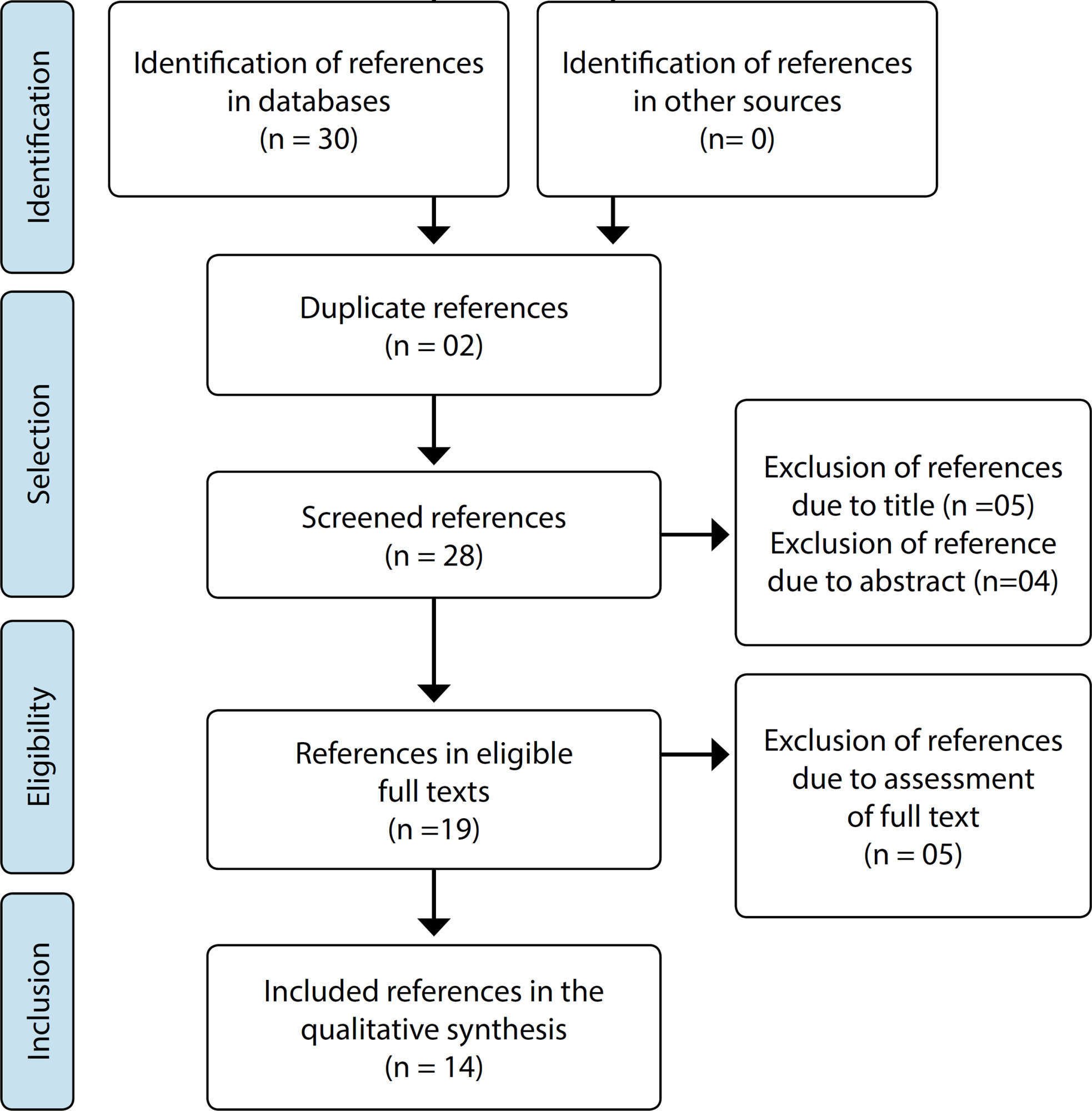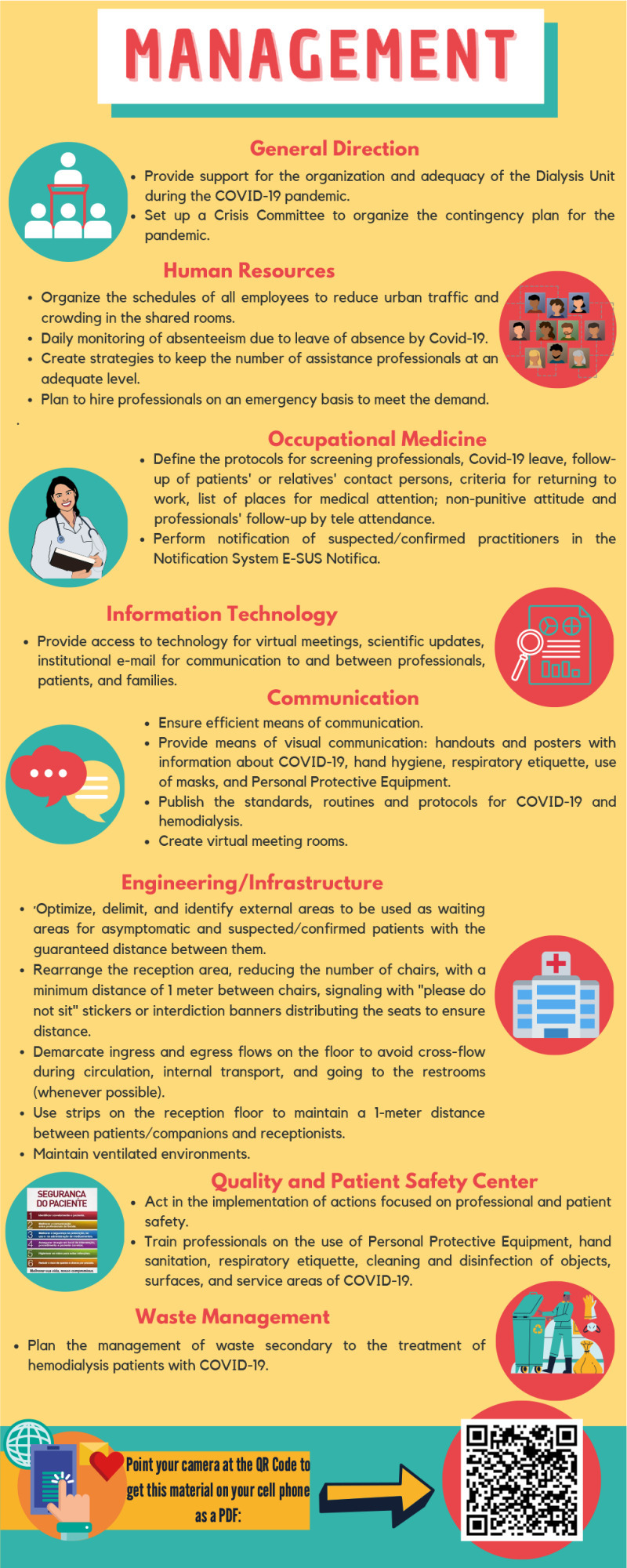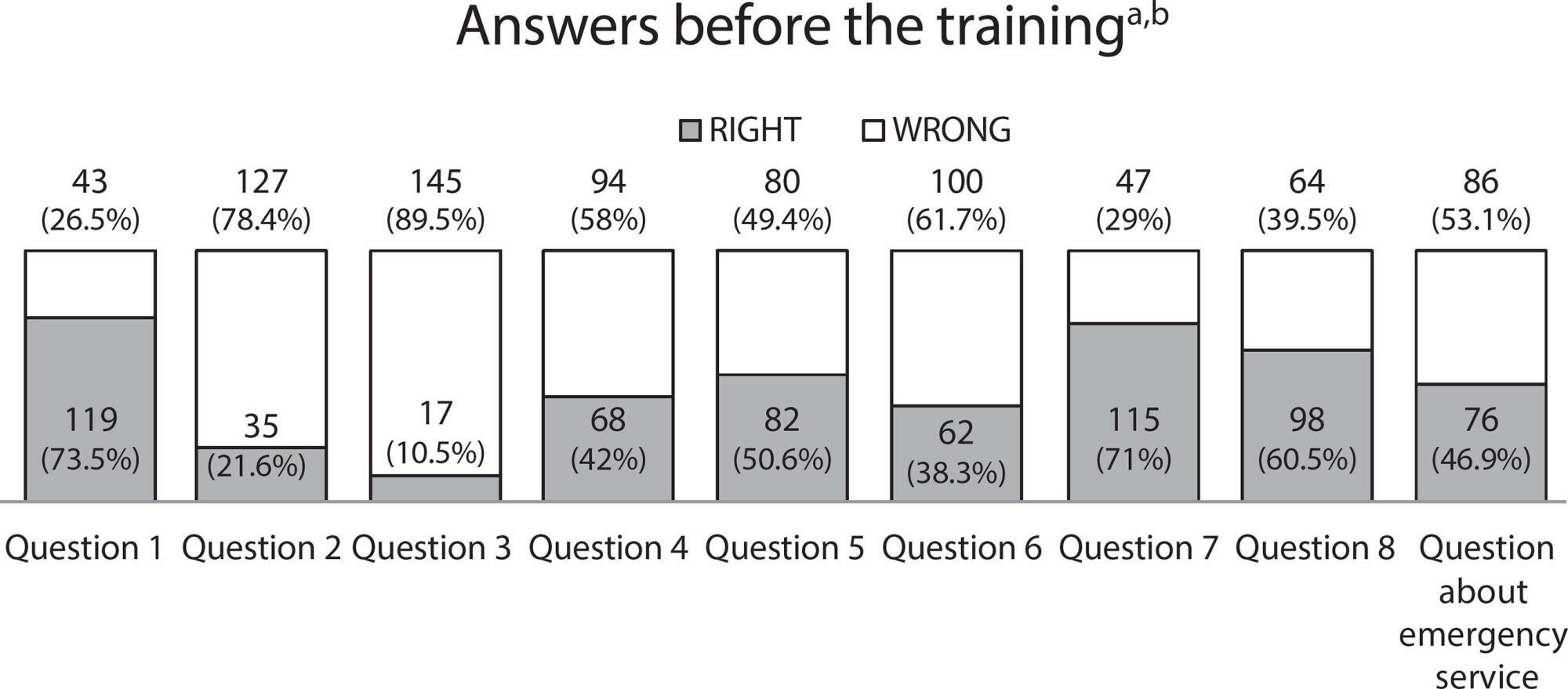-
REVIEW09-29-2022
Palliative care in Primary Health Care: an integrative literature review
Revista Brasileira de Enfermagem. 2022;75(1):e20201335
Abstract
REVIEWPalliative care in Primary Health Care: an integrative literature review
Revista Brasileira de Enfermagem. 2022;75(1):e20201335
DOI 10.1590/0034-7167-2020-1335
Views0See moreABSTRACT
Objectives:
to analyze scientific evidence on the implementation and performance of palliative care in Primary Health Care.
Methods:
an integrative literature review, according to the Preferred Reporting Items for Systematic Reviews and Meta-Analyses, carried out in the PubMed, SciVerse Scopus and LILACS databases, in December 2020, without a time frame.
Results:
22 original scientific articles were analyzed, 14 classified as evidence level VI. The objective was to understand the experiences and roles of professionals, patients and families on palliative care in Primary Health Care, articles focused on the theme of management and organization of health services and on the importance of educational interventions on the subject.
Final Considerations:
evidence found relating palliative care in Primary Health Care points to the possibility of this care; health teams work closely with the family and their home, but the need to expand this theme is still perceived.

-
REVIEW09-29-2022
Children with congenital heart disease in COVID-19 pandemic times: an integrative review
Revista Brasileira de Enfermagem. 2022;75(1):e20201033
Abstract
REVIEWChildren with congenital heart disease in COVID-19 pandemic times: an integrative review
Revista Brasileira de Enfermagem. 2022;75(1):e20201033
DOI 10.1590/0034-7167-2020-1033
Views0See moreABSTRACT
Objective:
to identify the scientific production in health about children with congenital heart disease in COVID-19 pandemic times.
Method:
this is an integrative review, carried out in June 2020 in the information resources Latin American and Caribbean Literature in Health Sciences (LILACS), National Library of Medicine, National Institutes of Health (PubMed), Scientific Electronic Library Online Journal Portal (SciELO) and Brazilian Institute of Information Science and Technology (Oasis Ibict).
Results:
14 studies composed this review. Most studies pointed to tests, interventional procedures and surgery for children with heart disease in pandemic times; others discussed possible complications of COVID-19 among children with congenital heart disease.
Conclusion:
the incipient production of studies and the weak level of evidence denote an important knowledge gap so far, highlighting the need for studies with strong scientific evidence for the formulation of care guidelines aimed at children with heart disease.

-
ORIGINAL ARTICLE09-29-2022
Palliative care production for health professionals in the context of home care
Revista Brasileira de Enfermagem. 2022;75(1):e20210030
Abstract
ORIGINAL ARTICLEPalliative care production for health professionals in the context of home care
Revista Brasileira de Enfermagem. 2022;75(1):e20210030
DOI 10.1590/0034-7167-2021-0030
Views1See moreABSTRACT
Objectives:
to analyze palliative care production developed by health professionals to home care patients.
Methods:
this is an exploratory study, with a qualitative approach, using the transpersonal care theoretical framework. Thirteen interviews were conducted with health professionals and 18 observations were conducted on different cases. Content analysis was performed using MAXQDA©.
Results:
actions performed: maintenance and follow-up measures to people eligible for palliative care, in acts of dialogue and “listening” to caregivers and users, conducting guidelines for the care and self-care process, performing technical procedures, delivery of materials, referrals and medical prescriptions to users.
Final Considerations:
it is perceived the need for advances in the implementation of government policies in Brazil that insert palliative care into the Health Care Network through educational, managerial and care actions that ensure human dignity, thus allowing the development of these and other palliative care interventions.
-
ORIGINAL ARTICLE09-29-2022
Incidence of acute radiodermatitis in women with breast cancer undergoing hypofractionated radiotherapy
Revista Brasileira de Enfermagem. 2022;75(1):e20210118
Abstract
ORIGINAL ARTICLEIncidence of acute radiodermatitis in women with breast cancer undergoing hypofractionated radiotherapy
Revista Brasileira de Enfermagem. 2022;75(1):e20210118
DOI 10.1590/0034-7167-2021-0118
Views0See moreABSTRACT
Objective:
To estimate the incidence and degree of acute radiodermatitis at the end and after the end of treatment in women with breast cancer undergoing hypofractionated radiotherapy.
Methods:
Observational, prospective, and longitudinal study, conducted between March 2019 and January 2020, in a radiotherapy outpatient clinic.
Results:
Thirty-two women participated in the study, among whom, in the last session of hypofractionated radiotherapy, 15 (46.9%) had radiodermatitis, erythema in 13 (40.6%), and wet peeling in 2 (6.3%). In the post-treatment evaluation, 27 (84.4%) had radiodermatitis, erythema in 17 (53.1%), dry peeling in 8 (25%), and wet peeling in 2 (6.3%).
Conclusion:
The general incidence of radiodermatitis after hypofractionated radiotherapy in women with breast cancer was 37.5%, erythema, 12.5%, and dry peeling, 25%. The development of care protocols for the management of radiodermatitis after treatment is of paramount importance.
-
ORIGINAL ARTICLE09-29-2022
Neither angels nor heroes: nurse speeches during the COVID-19 pandemic from a Foucauldian perspective
Revista Brasileira de Enfermagem. 2022;75:e20201329
Abstract
ORIGINAL ARTICLENeither angels nor heroes: nurse speeches during the COVID-19 pandemic from a Foucauldian perspective
Revista Brasileira de Enfermagem. 2022;75:e20201329
DOI 10.1590/0034-7167-2020-1329
Views1See moreABSTRACT
Objective:
to analyze the processes of meaning production, based on the speeches of nursing professionals, about how they feel about the titles of “angels and heroes” given by society during the pandemic of COVID-19.
Methods:
a qualitative, documentary research. Data was collected in October and November 2020 and analyzed from the perspective of the Discourse Analysis proposed by Michel Foucault.
Results:
they were organized into two thematic categories: “Angels and heroes? The (not) heroic reality of nursing during the pandemic” and “The search for recognition of the professional work of nursing: between what is said and what is not said”.
Final considerations:
the nurses’ speeches enunciate the search for decent conditions for the execution of care, fair wages, and recognition of the professional work by society.
-
EXPERIENCE REPORT09-29-2022
Mobile pre-hospital care reorganization during the COVID-19 pandemic: experience report
Revista Brasileira de Enfermagem. 2022;75:e20200826
Abstract
EXPERIENCE REPORTMobile pre-hospital care reorganization during the COVID-19 pandemic: experience report
Revista Brasileira de Enfermagem. 2022;75:e20200826
DOI 10.1590/0034-7167-2020-0826
Views0See moreABSTRACT
Objective:
To describe the reorganization of Belo Horizonte’s Mobile Emergency Care Service during the new coronavirus pandemic using the Plan Do-Check-Act quality tool.
Methods:
Descriptive study, of the experience report type, on the reorganization of care in a mobile pre-hospital care service during the new coronavirus pandemic, from March to July 2020. The Plan-Do-Check-Act quality tool was applied for the process.
Results:
Preparation of care protocol, meetings, training, addition of ambulances, hiring of professionals, and other actions were carried out, with subsequent evaluation and monitoring. When failures or new needs were identified, actions and changes were implemented while keeping monitoring and evaluation during the work routine.
Final considerations:
The reorganization of the service through the construction of a protocol and using the Plan-Do-Check-Act as a management tool was essential to promote safe care for professionals and patients.

-
REFLECTION09-29-2022
Health care of deaf persons during coronavirus pandemics
Revista Brasileira de Enfermagem. 2022;75:e20201036
Abstract
REFLECTIONHealth care of deaf persons during coronavirus pandemics
Revista Brasileira de Enfermagem. 2022;75:e20201036
DOI 10.1590/0034-7167-2020-1036
Views0See moreABSTRACT
Objective:
To reflect about the barriers experienced by the deaf population during the COVID-19 pandemic, the proposals to overcome communication barriers in health care and the role of public policies in effecting the social inclusion of deaf people.
Methods:
Reflection based on studies on health care for deaf people, the COVID-19 pandemic and public accessibility policies.
Results:
The global crisis of COVID-19 has deepened pre-existing inequalities in the world, in addition to highlighting the vulnerability of people with disabilities, including deaf. Government, institutional and social initiatives to mitigate difficulties in communicating to deaf people have been made, but they are still insufficient to guarantee protection for them in this pandemic and full inclusion in health care.
Final considerations:
Social inclusion, supported by law, and the linguistic accessibility of deaf people still need to generate broad and concrete actions so that deaf people can enjoy their rights as citizens.
-
REFLECTION09-29-2022
Hemodialysis in the context of COVID-19: care, nursing protagonism and quality
Revista Brasileira de Enfermagem. 2022;75:e20201077
Abstract
REFLECTIONHemodialysis in the context of COVID-19: care, nursing protagonism and quality
Revista Brasileira de Enfermagem. 2022;75:e20201077
DOI 10.1590/0034-7167-2020-1077
Views0See moreABSTRACT
Objective:
To reflect on the need to reorganize satellite dialysis units to ensure the safety of patients and workers, focusing on minimizing the risk of contamination by SARS-CoV-2.
Methods:
Reflection considering the guidelines of international and Brazilian institutions and scientific articles, with a view to possible adaptations to the Brazilian reality.
Results:
The actions suggested and adapted by Dialysis Units from different countries during the pandemic focus on the quality of care and safety of the patient and workers. There was an opportunity to reflect on these actions using the Donabedian Model for quality of care and highlight the nursing team’s role in this context.
Final considerations:
The focus on quality and safety related to institutionalized processes and the assessment through indicators can contribute to the management of the outpatient dialysis unit in the context of COVID 19.

-
ORIGINAL ARTICLE09-07-2020
Attitudes, knowledge and skills of nurses in the Xingu Indigenous Park
Revista Brasileira de Enfermagem. 2020;73(6):e20190632
Abstract
ORIGINAL ARTICLEAttitudes, knowledge and skills of nurses in the Xingu Indigenous Park
Revista Brasileira de Enfermagem. 2020;73(6):e20190632
DOI 10.1590/0034-7167-2019-0632
Views0See moreABSTRACT
Objective:
to analyze the attitudes, knowledge and skills that make up the professional competencies of nurses working in indigenous territories.
Method:
this is an exploratory-descriptive study with a qualitative approach, conducted with nurses working in the Xingu Indigenous Park in 2016. Data were obtained in semi-structured interviews and treated according to the thematic-categorical analysis method.
Results:
the nurse’s performance in the Xingu Indigenous Park has a multifaceted character, being defined by the territory’s interculturality and specificities and by how the service is organized. Technical skills, concepts from anthropology and attitudes that facilitate a respectful dialogue with cultural difference are required for a professional to act in this context.
Final considerations:
the performance of health professionals in indigenous territories requires specificities associated with the acquisition of new knowledge, attitudes and skills geared to the intercultural dimension of the work developed.
-
ORIGINAL ARTICLE03-09-2020
Quality of life at work in a central sterile processing department
Revista Brasileira de Enfermagem. 2020;73(2):e20180792
Abstract
ORIGINAL ARTICLEQuality of life at work in a central sterile processing department
Revista Brasileira de Enfermagem. 2020;73(2):e20180792
DOI 10.1590/0034-7167-2018-0792
Views1See moreABSTRACT
Objectives:
to evaluate the quality of life of nursing professionals who work in a central sterile processing department.
Methods:
a descriptive, quantitative, exploratory study, conducted with 82 nursing professionals working in the Central Sterile Processing Department of a University Hospital, from September to November 2017. A semi-structured instrument and the questionnaire “Medical Outcomes Study Short-Form 36” were used. Results: most of the participants were female, married, aged 31-40 years; 47.6% with 6-10 years of profession, and 82.9% reported working in CSPD for 1-5 years. The most affected quality of life domains were Pain, Vitality, General Health Status and Social Aspects.
Conclusions:
This study showed a need for rethinking and re-creating the labor dynamics in CSPD to improve the quality of life of these nursing professionals.
-
ORIGINAL ARTICLE10-21-2019
Mental health in primary health care: health-disease according to health professionals
Revista Brasileira de Enfermagem. 2019;72(6):1609-1617
Abstract
ORIGINAL ARTICLEMental health in primary health care: health-disease according to health professionals
Revista Brasileira de Enfermagem. 2019;72(6):1609-1617
DOI 10.1590/0034-7167-2018-0743
Views0See moreABSTRACT
Objective:
to analyze perceptions of the Family Health Strategy (FHS) professional team about mental health-disorder and to identify health actions developed by the team for people with mental disorders.
Method:
a qualitative study of a Marxist theoretical framework and a dialectical method. 99 FHS middle and higher level professionals from São Paulo participated. Semi-structured interviews were conducted. Data were submitted to ALCESTE software and Thematic Content Analysis.
Results:
there were three empirical categories: Training in Mental Health; Perception of the FHS professional about mental health-disorder; and Health actions developed by the FHS team with people with mental disorders. Actions that converge and diverge from the psychosocial care model were identified.
Final considerations:
there is an effort from professionals to work according to the psychosocial care model, but it is necessary to invest in the Permanent Education in Health of these professionals to overcome barriers and foster successful territorial actions.
-
ORIGINAL ARTICLE03-30-2020
Best Safety Practices in nursing care in Neonatal Intensive Therapy
Revista Brasileira de Enfermagem. 2020;73(2):e20180482
Abstract
ORIGINAL ARTICLEBest Safety Practices in nursing care in Neonatal Intensive Therapy
Revista Brasileira de Enfermagem. 2020;73(2):e20180482
DOI 10.1590/0034-7167-2018-0482
Views0See moreABSTRACT
Objectives:
to identify the perception of nursing professionals on human errors in nursing care at a Neonatal Intensive Care Unit and to assess Best Practices strategies proposed by these professionals for patient safety in nursing care.
Methods:
this is a quantitative-qualitative, descriptive study. Setting: Neonatal Intensive Care Unit. Participants: 22 nursing professionals. Data collection was performed through interviews and sent to the thematic analysis.
Results:
human errors in nursing care, such as wasted catheters; errors in the medication process; causes for error in nursing care, with a focus on work overload; Best Practices for patient safety in nursing care, such as professional training and improved working conditions.
Conclusions:
it is of utmost importance to invest in Best Practices strategies for Patient Safety, aimed at consolidating the culture of organizational safety and encouraging an adequate environment to manage errors.
-
ORIGINAL ARTICLE10-21-2019
Self-confidence in the care of critically ill patients: before and after a simulated intervention
Revista Brasileira de Enfermagem. 2019;72(6):1618-1623
Abstract
ORIGINAL ARTICLESelf-confidence in the care of critically ill patients: before and after a simulated intervention
Revista Brasileira de Enfermagem. 2019;72(6):1618-1623
DOI 10.1590/0034-7167-2018-0758
Views0See moreABSTRACT
Objective:
To evaluate the self-confidence of nurses in the care of critically ill patients, before and after a simulated intervention.
Method:
A quasi-experimental study was carried out with 103 nurses who participated in a workshop on the care of critically ill patients in the first semester of 2016. A clinical simulation pedagogical instrument was used throughout the event, and self-confidence was assessed by the Portuguese version of the Self-confidence Scale (SCSvp).
Results:
Most participants reported not being prepared to provide first care to critically ill patients, which was carried out during care practice. The participants presented a significant increase in self-confidence after the simulated intervention (p<0.001) in the cardiac, neurological, and respiratory dimensions.
Conclusion:
Simulation has proved to be an effective strategy for the development of individuals’ self-confidence, which contributes to the improvement of skills required for professional practice.
-
ORIGINAL ARTICLE08-07-2020
Permanent education and matrix support in primary health care: family health routine
Revista Brasileira de Enfermagem. 2020;73(6):e20190076
Abstract
ORIGINAL ARTICLEPermanent education and matrix support in primary health care: family health routine
Revista Brasileira de Enfermagem. 2020;73(6):e20190076
DOI 10.1590/0034-7167-2019-0076
Views1See moreABSTRACT
Objective:
To analyze the understanding of the professionals working on the Family Health Support by about permanent education and matrix support in the daily routine of primary health care.
Methods:
Descriptive research with a qualitative approach. Data were collected through semi-structured interviews with the participation of 19 professionals from different backgrounds. The results were organized based on Thematic Content Analysis.
Results:
Thematic categories emerged from the analysis: Permanent Health Education: knowledge and daily activities; Matrix support as a premise of Permanent Health Education; The principle of integrality as the foundation of the supporting teams; Conditions of praxis in the promotion of Permanent Health Education.
Final Considerations:
The study evidenced that professionals experience their routines within the service and that the sharing of knowledge to transform the reality of users and the territory is based on matrix support and integrality. However, they face structural difficulties in carrying out actions.
-
ORIGINAL ARTICLE02-17-2020
Effect of first aid training on teams from special education schools
Revista Brasileira de Enfermagem. 2020;73(2):e20180288
Abstract
ORIGINAL ARTICLEEffect of first aid training on teams from special education schools
Revista Brasileira de Enfermagem. 2020;73(2):e20180288
DOI 10.1590/0034-7167-2018-0288
Views0See moreABSTRACT
Objectives:
Analyze the effect of first aid training on the knowledge of multidisciplinary teams from special education schools, in school accidents.
Methods:
A quasi-experimental, before-and-after study with a single comparison group. Descriptive statistics and McNemar’s test were used to evaluate the effect of the intervention.
Results:
This study had the participation of 162 higher education professionals, predominantly teachers (82.1%), female (97.5%), aged over 40 (69.2%). An increase in correct answers was observed, with statistical significance (≤0.05), especially in proper handling in case of fall with traumatic brain injury, electric shock, and burn due to hot liquid (98.1%, 98.1% and 96.9% of proper response, respectively).
Conclusions:
First aid training for child accidents, through content exhibition, in a dialogical and practical way, proved to be efficient for multidisciplinary teams from special education schools for people with disabilities.

-
ORIGINAL ARTICLE03-03-2021
Trend of transplants and organ and tissue donations in Brazil: a time series analysis
Revista Brasileira de Enfermagem. 2021;74(1):e20200058
Abstract
ORIGINAL ARTICLETrend of transplants and organ and tissue donations in Brazil: a time series analysis
Revista Brasileira de Enfermagem. 2021;74(1):e20200058
DOI 10.1590/0034-7167-2020-0058
Views0See moreABSTRACT
Objectives:
to indentify the time trend of rates of organs and tissues effective donors, of reports and types of transplanted organs per million people of the Brazilian population.
Methods:
ecological study, of time series, about reports of organ donations and on transplants. The data were provided by the Registro Brasileiro de Transplantes and analyzed using polynomial regression.
Results
an increasing trend was found for potential donors and effective donors, with an average increase of 2.33 and 0.92 per year, respectively. The South Region had the highest rate of potential donors (83.8) and effective donors (34.1) and the North Region, the lowest rate (20.2 and 3.9). The family refusal was the main obstacle to accomplish the donation.
Conclusions
the results show an increasing trend of potential donors and effective donors throughout Brazil, with emphasis on the southern region of the country. Among the main reasons for non-donation, it is worth emphasizing family refusal and medical contraindication prescription.
Search
Search in:
Nuvem de Tags
Adolescente (85) Atenção Primária à Saúde (239) COVID-19 (91) Criança (91) Cuidados de Enfermagem (269) Educação em Enfermagem (151) Educação em Saúde (139) Enfermagem (930) Enfermagem Pediátrica (86) Estudantes de Enfermagem (77) Estudos de Validação (131) Família (87) Idoso (208) Promoção da Saúde (99) Qualidade de Vida (104) Saúde do Trabalhador (86) Saúde Mental (145) Saúde Pública (82) Segurança do Paciente (150) Tecnologia Educacional (100)



